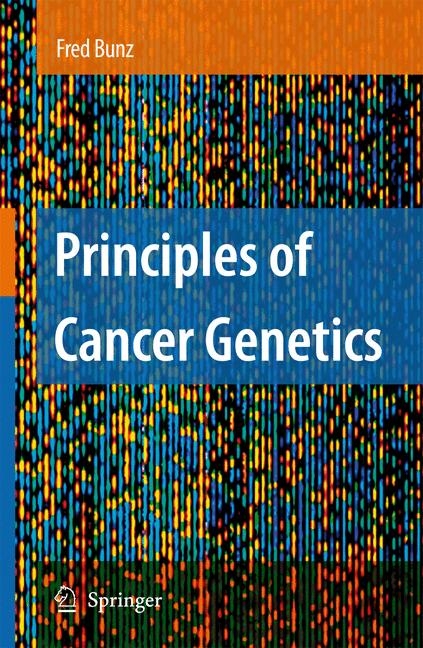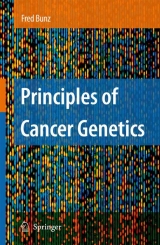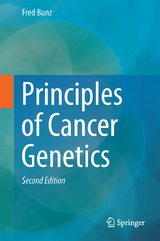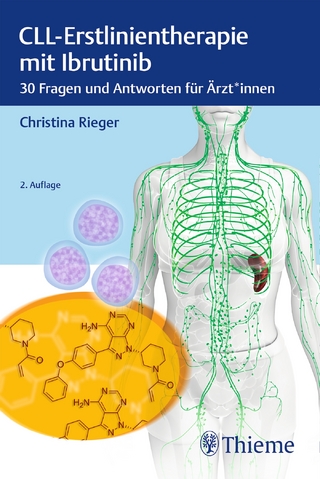Principles of Cancer Genetics
Springer-Verlag New York Inc.
978-1-4020-6783-9 (ISBN)
- Titel erscheint in neuer Auflage
- Artikel merken
This concise guidebook consolidates the main concepts of the cancer gene theory, and provides a framework for understanding the genetic basis of cancer. Focused on the most highly representative genes that underlie the most common cancers, the book is aimed at advanced undergraduates who have completed introductory courses in genetics, biology and biochemistry, medical students, and house medical house staff preparing for board examinations. Primary attention is devoted to the origins of cancer genes and the application of evolutionary theory to explain why the cell clones that harbor cancer genes tend to expand.
Chapter 1: The Genetic Basis of Cancer The cancer gene theory Cancers are invasive tumors Cancer is a unique type of genetic disease What are cancer genes and how are they acquired? Mutations alter the human genome Genes and mutations Genetic variation and cancer genes Which mutations are important in cancer? Single nucleotide substitutions Gene silencing by cytosine methylation: epigenetics Environmental mutagens, mutations and cancer Inflammation promotes the propagation of cancer genes Darwinian selection and the clonal evolution of cancers Selective pressure and adaptation: hypoxia and altered metabolism Multiple somatic mutations punctuate clonal evolution How many mutations contribute to a cancer? Colorectal cancer: a model for understanding the process of tumorigenesis Do cancer cells divide more rapidly than normal cells? Germline cancer genes allow neoplasia to bypass steps in clonal evolution Cancer syndromes reveal rate-limiting steps in tumorigenesis Understanding cancer genetics Chapter 2: Oncogenes What is an oncogene? The discovery of transmissible cancer genes Viral oncogenes are derived from the host genome The search for activated oncogenes: the RAS gene family Complex genomic rearrangements: the MYC gene family Proto-oncogene activation by gene amplification Proto-oncogene activation by chromosomal translocation Chromosomal translocations in liquid and solid tumors Chronic myeloid leukemia and the Philadelphia chromosome Ewing's sarcoma and the oncogenic activation of a transcription factor Oncogene discovery in the genomic era: mutations in PIK3CA Selection of tumor-associated mutations Multiple modes of proto-oncogene activation Oncogenes are dominant cancer genes Germline mutations of RET and MET confer cancer predisposition Proto-oncogene activation and tumorigenesis Chapter 3: Tumor SuppressorGenes What is a tumor suppressor gene? The discovery of recessive cancer phenotypes Retinoblastoma and Knudson's two-hit hypothesis Chromosomal localization of the retinoblastoma gene The mapping and cloning of the retinoblastoma gene Tumor suppressor gene inactivation: the second 'hit' and loss of heterozygosity Recessive genes, dominant traits APC inactivation in inherited and sporadic colorectal cancers P53 inactivation: a frequent event in tumorigenesis Functional inactivation of p53: tumor suppressor genes and oncogenes interact Germline inheritance of mutant P53: Li Fraumeni syndrome Cancer predisposition: allelic penetrance, relative risk and odds ratios Breast cancer susceptibility: BRCA1 and BRCA2 Genetic losses on chromosome 9: CDKN2A Complexity at CDKN2A: neighboring and overlapping genes Genetic losses on chromosome 10: PTEN SMAD4 and the maintenance of stromal architecture Two distinct genes underlie neurofibromatosis Multiple endocrine neoplasia type 1 Most tumor suppressor genes are tissue-specific Modeling cancer syndromes in mice Tumor suppressor gene inactivation during colorectal tumorigenesis Inherited tumor suppressor gene mutations: gatekeepers and landscapers Maintaining the genome: caretakers Chapter 4: Genetic Instability and Cancer What is genetic instability? The majority of cancer cells are aneuploid Aneuploid cancer cells exhibit chromosome instability Chromosome instability arises early in colorectal tumorigenesis Chromosomal instability accelerates clonal evolution What causes aneuploidy? Transition from tetraploidy to aneuploidy during tumorigenesis Multiple forms of genetic instability in cancer Defects in mismatch repair cause hereditary nonpolyposis colorectal cancer Mismatch repair-deficient cancers have a distinct spectrum of mutations Defects in nucleotide excision repair cause xeroderma
| Erscheint lt. Verlag | 14.1.2008 |
|---|---|
| Zusatzinfo | biography |
| Verlagsort | New York, NY |
| Sprache | englisch |
| Maße | 234 x 156 mm |
| Gewicht | 659 g |
| Themenwelt | Medizin / Pharmazie ► Medizinische Fachgebiete ► Onkologie |
| Medizin / Pharmazie ► Studium | |
| ISBN-10 | 1-4020-6783-6 / 1402067836 |
| ISBN-13 | 978-1-4020-6783-9 / 9781402067839 |
| Zustand | Neuware |
| Informationen gemäß Produktsicherheitsverordnung (GPSR) | |
| Haben Sie eine Frage zum Produkt? |
aus dem Bereich





